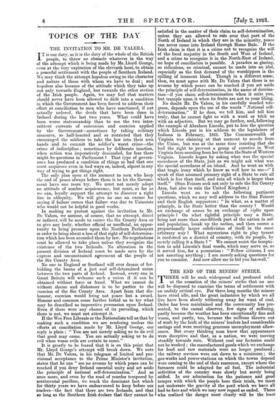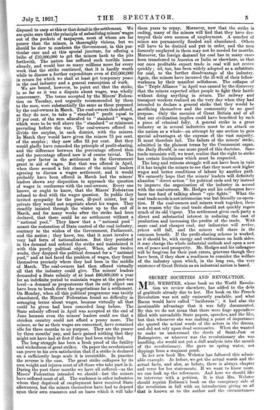THE END OF THE MINERS' STRIKE.
THERE will be such widespread and profound relief at the cessation of the miners' strike that no one will be disposed to examine the terms of settlement with an unduly critical eye. For three long months the miners have stood idle, and the great industries by which we all live have been slowly withering away for want of coal. Order has been maintained and the community has pre- sented, to the casual observer, few signs of suffering, partly because the weather has been exceptionally fine and warm, and partly, too, because the millions thrown out of work by the fault of the miners' leaders had considerable savings and were receiving generous unemployment allow- ances. But every thinking man knew that appearances were deceptive and that, as a nation, we were moving steadily towards ruin. Without coal our factories could not be worked ; the manufactured goods which we exchange for food and raw materials were no longer produced ; the railway services were cut down to a minimum ; the gas-works and power-stations on which the towns depend were coming to the end of their resources, except where the furnaces could be adapted for oil fuel. The industrial activities of the country were slowly but surely being stifled. In our admiration for the patience and good temper with which the people bore their trials, we must not underrate the gravity of the peril which we have all had to face and which we may now regard as ended. Those who realized the danger most clearly will be the least disposed to carp at this or that detail in the settlement. We are quite sure that the principle of subsidizing miners' wages out of the pockets of taxpayers, most of .whom are far poorer than the miners, is thoroughly vicious, but we should be slow to condemn the Government, in this par- ticular case and at this special juncture, for offering a bribe of £10,000,000 to get the miners back to the pits forthwith. The nation has suffered such terrible losses afready, and would lose so many millions more for every week 'that the strike continued, that it is hardly worth while to discuss a further expenditure even of £10,000,000 in return for which we shall at least get temporary peace in the coal industry nd a general resumption of work. We are bound, to point out that the strike, in so far as it was a dispute about wages, was wholly unnecessary. The terms accepted by the Miners' Federa- tion on Tuesday, and urgently recommended by them to the men, were substantially the same as those proposed by the coal-owners in March. The coal-owners then offered, as they do now, to take a " standard " profit equal to 17 per cent, of the sum allocated to " standard " wages, which were to be well above the "standard " or minimum prevailing before the war. The coal-owners offered to divide the surplus, in each district, with the miners. In March they would have given the miners 75 per cent. of the surplus ; they now offer 83 per cent. But they would gladly have conceded the principle of profit-sharing, and the difference between the percentage offered then and the percentage offered now is of course trivial. The only new factor in the settlement is the Government grant in aid of wages. But that was offered in April, when there seemed a fair chance of the miners' leaders agreeing to discuss a wages settlement, and it would probably have been offered in March had the miners' leaders shown any disposition to approach the question of wages in conference with the coal-owners. Every one knows, or ought to know, that the Miners' Federation refused to deal with the wages question. In public they invited sympathy for the poor, ill-paid miner, but in private they would not negotiate about his wages. They steadily insisted through the winter up to the end of March, and for many weeks after the strike had been declared, that there could be no settlement without a "national pool." They knew that a "national pool" meant the restoration of State control of the coal industry, contrary to the wishes of the Government, Parliament, and the nation ; they knew, too, that it must involve a very bad form of nationalization. But they persisted in the demand and ordered the strike and maintained it with this purely political object. When, after twelve weeks, they dropped the political demand for a "national pool," and at last faced the problem of wages, they found themselves precisely where they had been in the middle of March. The coal-owners had then offered virtually all that the industry could give. The miners' leaders demanded a State subsidy of at least £60,000,000 a year for an indefinite period to maintain wages at the post-war level—a demand so preposterous that its only object can have been to break down the negotiations for a settlement. On Monday, when all this political programme was tacitly abandoned, the Miners' Federation found no difficulty in arranging terms about wages, because virtually all that could be given had been conceded long before. The State subsidy offered in April was accepted at the end of June because even the miners' leaders could see that a stricken country could not afford a penny more. The miners, so far as their wages are concerned, have remained idle for three months to no purpose. They are the poorer by three months' pay, and have gained nothing that they might not have had at first if they had been wisely led. The long-struggle has been a fresh proof of the futility and wickedness of great strikes. On paper the revolutionist can prove to his own satisfaction that if a strike is declared on a sufficiently large scale it is irresistible. In practice the reverse is the case. The great strike collapses by its own weight and injures most of all those who take part in it. During the past three months we have all suffered—as the Miners' Federation intended we should—but the miners have suffered most of all. The workmen in other industries whom they deprived of employment have received State allowances, but the miners themselves have had to depend upon their own resources and on loans which it will take them years to repay. Moreover, now that the strike is ending, many of the miners will find that they have des- troyed their own sources of employment. A number of mines are permanently flooded and abandoned. Others will have to be drained and put in order, and the men formerly employed in them may not be needed for months. Moreover, the foreign demand for coal has in many cases been transferred to America or India or elsewhere, so that our once profitable export trade in coal will not revive quickly ; oil, too, has been widely adopted as a substitute for coal, to the further disadvantage of the industry. Again, the miners have incurred the ill-will of their fellow- workmen by their manifest selfishness. The collapse of the " Triple Alliance "in April was caused by the discovery that the miners expected other people to fight their battle without doing anything in return. The railway and transport workers realized on the very day when they had intended to declare a general strike that they would be sacrificing themselves and the community to no good purpose. Only the enemies of Great Britain and of all that our civilization implies could have benefited by such a piece of criminal folly. A general strike in a great industry or in several industries must be an attack on the nation as a whole—an attempt by one section to gain special advantages at the expense of the vast majority. It must therefore fail. The failure of the miners' strike, admitted in the plainest terms by the Communist organ, the .Daily Herald, is one more proof of this doctrine. Sane trade unionists will, we trust, realize that the right to strike has certain limitations which must be respected.
The long and ruinous struggle will not have been in vain if it has taught the miners to see that they must seek higher wages and better conditions of labour by another path. We earnestly hope that the miners' leaders will definitely abandon "direct action" for political ends and try instead to improve the organization of the industry in accord with the coal-owners. Mr. Hodges and his colleagues have been too fond of talking about "epic fights." What the coal trade needs is not internecine war but friendly co-opera- tion. If the coal-owners and miners work together, there is no reason why the coal trade should not quickly regain much of its old vigour. The settlement gives each party a direct and substantial interest in reducing the cost of production and increasing the profits of the trade. With more coal and cheaper coal, our industries will revive, prices will fall, and the miners will share in the common benefit. If the profit-sharing scheme is worked, as it should be, with energy and enthusiasm on both sides, it may change the whole industrial outlook and open a new era of peace and prosperity. Mr. Hodges and his colleagues will be forgiven for their past errors, grievous though they have been, if they show a readiness to consider the welfare of the industry upon which, in the long run, the very existence of Great Britain as an industrial nation is based.











































 Previous page
Previous page